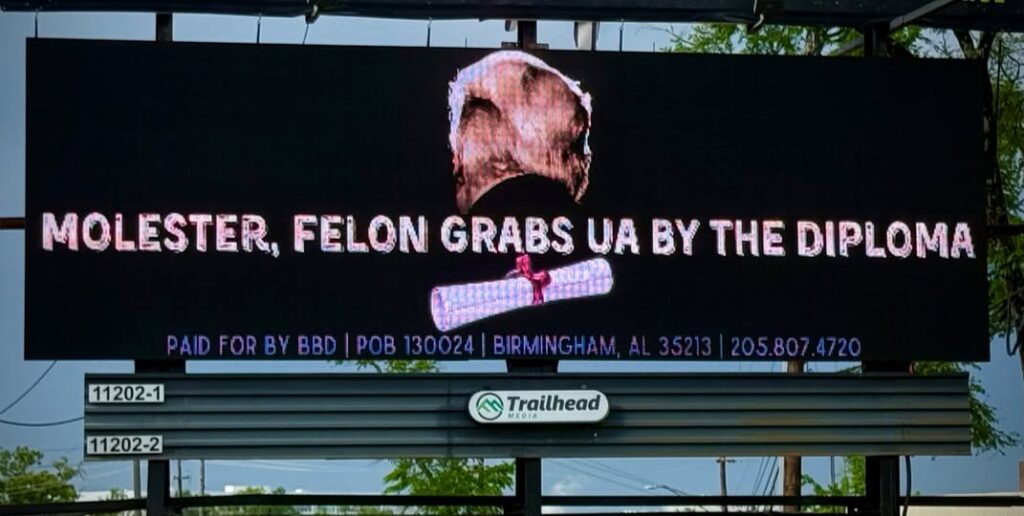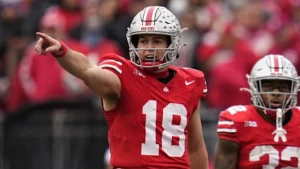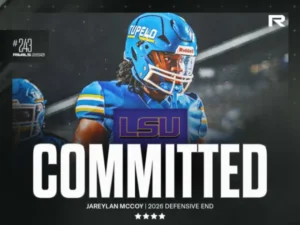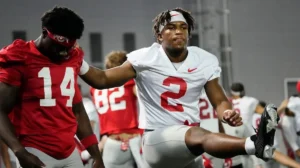
A digital billboard on Birmingham’s Southside makes it clear that not everyone approves of President Donald Trump's planned appearance at the University of Alabama.
President Donald Trump supporters are applauding his impending visit to the University of Alabama, but a digital billboard on Birmingham’s Southside makes it apparent that not everyone is welcoming him.
When President Donald Trump announced he would attend the University of Alabama’s marquee football matchup against LSU, it set off a wave of excitement across large sections of the state. In a region where Trump boasts strong approval ratings, many Crimson Tide fans and local citizens eagerly anticipated his arrival, viewing it as an affirmation of Alabama’s political identity and cultural values.
However, a sharp reminder of the country’s polarized climate materialized just days before the visit: a digital billboard in Birmingham’s Southside district delivered a distinctly different message. Flashing bold, critical images and statements, the display underscored that Trump’s reception in Alabama, while overwhelmingly supportive in many quarters, would not be universal.
The juxtaposition of fervent celebration and visible protest captured a larger national theme—one where even seemingly unifying events like a college football game become stages for political and cultural expression.
For many Trump supporters in Alabama, the president’s decision to attend the Alabama-LSU game was nothing short of an honor. Alabama, a state that delivered one of the highest margins of victory for Trump in both the 2016 and 2020 elections, is often cited as part of his political base. His appearance at Bryant-Denny Stadium was seen by supporters as a tribute to the “heart of Trump Country.”
Tickets for the game were already some of the hottest in town, given the top-5 matchup between two college football powerhouses. But with Trump’s visit announced, demand soared even higher. Fans began planning tailgates themed around patriotism and Trump memorabilia. Local vendors reported surging sales of MAGA hats, Trump-themed Alabama gear, and American flags.
“Having President Trump here feels like validation,” said Cody Brewer, a University of Alabama alumnus and Tuscaloosa resident. “This state has always stood behind him, and seeing him at our biggest game of the year just makes us proud.”
University officials, while careful to maintain an appearance of political neutrality, made logistical arrangements with the Secret Service and law enforcement agencies to ensure a smooth and secure visit. Traffic rerouting plans were announced, parking zones adjusted, and additional security measures put in place around the stadium and key areas of campus.
Despite the widespread enthusiasm, not everyone in Alabama welcomed Trump’s visit with open arms.
On Birmingham’s Southside, a heavily trafficked and socially diverse area, a digital billboard began displaying pointed messages critical of the president. Sponsored anonymously, the billboard rotated images and slogans referencing issues such as immigration policy, civil rights concerns, and Trump’s handling of various national controversies.
Images included depictions of migrant children in detention centers, quotes from Trump’s controversial speeches, and statistics highlighting Alabama’s struggles with poverty and health care—issues that critics argue were exacerbated or ignored during his presidency.
“This billboard is a reminder that not every Alabamian blindly supports Trump,” said Rachel Simmons, a Birmingham activist. “There are plenty of people here who are concerned about where this country is heading, and it’s important that those voices aren’t drowned out.”
The billboard sparked immediate conversation on social media, with reactions sharply divided along ideological lines. Some praised it as a brave act of free speech in a predominantly conservative environment; others decried it as disrespectful, especially during a weekend many hoped would be centered solely around football.
Birmingham Mayor Randall Woodfin, a Democrat, issued a statement emphasizing the importance of respecting differing opinions: “Birmingham is a city that values diverse perspectives. Peaceful expression—whether in support or protest—is a hallmark of our democracy.”
This was not the first time Trump’s appearances at major sporting events had elicited strong, divergent reactions. Only weeks earlier, he attended Game 5 of the World Series in Washington, D.C., where he was met with a chorus of boos and “lock him up” chants.
In contrast, when he later attended a UFC fight in New York City, he received a mostly warm welcome. Trump’s relationship with sports audiences has always reflected the cultural divides of the country: rural and conservative-leaning crowds have tended to embrace him, while urban and more liberal audiences have shown resistance.
Given Alabama’s political landscape, most observers expected Trump to receive a warm reception in Tuscaloosa. Still, the mere presence of dissent—even if limited to places like Birmingham’s Southside—was a notable reminder that no figure, however popular in certain quarters, is immune from criticism.
University and city officials stressed repeatedly that they intended to keep the game day experience focused on football.
“We know this is a significant visit, and we respect the office of the presidency,” said a spokesperson for the University of Alabama. “However, our primary focus remains on ensuring a safe, enjoyable environment for our fans, students, and alumni.”
Local law enforcement coordinated extensively with the Secret Service. Provisions were made for both pro-Trump displays, such as flag marches and organized cheers, as well as for potential protest groups planning demonstrations around campus.
Indeed, both sides planned to make their voices heard. A pro-Trump parade was organized by a local group called “Alabama Patriots,” while several student organizations announced a peaceful protest march along University Boulevard.
“We’re not trying to ruin anyone’s game day,” said sophomore Olivia Hernandez, one of the protest organizers. “But we believe that silence is complicity. We want to use our platform to advocate for marginalized communities.”
The controversy surrounding the Birmingham billboard tapped into larger questions about Alabama’s political evolution. Although the state remains solidly red in national elections, urban centers like Birmingham, Huntsville, and Montgomery have seen demographic shifts and increasing progressive activism.
Political analysts suggest that while Alabama will likely remain a Republican stronghold for the foreseeable future, pockets of liberal thought are growing stronger, particularly among younger generations.
“The billboard represents a crack, however small, in the monolithic image of Alabama politics,” said Dr. Emily Nason, a political science professor at Samford University. “It signals that even in deeply conservative areas, political discourse is becoming more diverse.”
This dynamic is mirrored nationally, where rural-urban divides continue to deepen, and where expressions of dissent often emerge even in places previously assumed to be politically homogenous.
When Trump finally arrived in Tuscaloosa, he was greeted with roaring cheers as he and First Lady Melania Trump took their seats in a protected, visible area of the stadium. The crowd responded enthusiastically, with chants of “USA!” and “Four More Years!” ringing out during stoppages in play.
Footage of Trump waving and giving thumbs-up gestures circulated widely on social media, drawing both adulation from supporters and scorn from critics.
For many attendees, the president’s presence transformed an already monumental sporting event into something akin to a political rally.
“It was electric,” said Brittany McElroy, a senior at Alabama. “Seeing the president here, at our home, with everyone so united—it’s something I’ll remember forever.”
However, not far from the stadium, small groups of protesters held signs and chanted slogans calling attention to immigration issues, environmental policy, and what they described as “divisive leadership.”
In the days following Trump’s visit, conversation continued to swirl across Alabama media outlets, sports talk shows, and political podcasts. Most agreed that Trump had received an overwhelmingly positive reception inside the stadium—but the presence of protests, both physical and digital, was impossible to ignore.
Editorials in state newspapers captured the mood well. The Tuscaloosa News praised the peaceful execution of both celebratory and dissenting events, emphasizing that “free expression, on all sides, is something to be preserved.” The Birmingham News editorial board took a more cautious tone, warning that “Alabama must not become so insular that it forgets the value of critical thought and dissent.”
Online, debates raged about whether politics should be kept out of sports altogether. Some fans argued that Trump’s appearance politicized an otherwise neutral event; others contended that, in today’s America, politics and public life are inextricably linked.
In many ways, Trump’s visit to Alabama reflected the broader American experience: a nation deeply divided yet still capable of assembling in shared spaces. While the cheers inside Bryant-Denny Stadium were deafening, the billboard on Birmingham’s Southside blinked defiantly on, speaking to a different America—one just as real, if less loudly celebrated.
Alabama, often viewed as a symbol of steadfast conservatism, demonstrated that even within its heartland, differing visions for the country’s future coexist, sometimes uncomfortably.
As the country barrels toward another pivotal election year, the images from Trump’s Alabama visit—both the triumphal stadium shots and the critical digital billboards—serve as vivid reminders: in 2025 America, every celebration comes with an undercurrent of debate, and every rally has its rebuttal.





